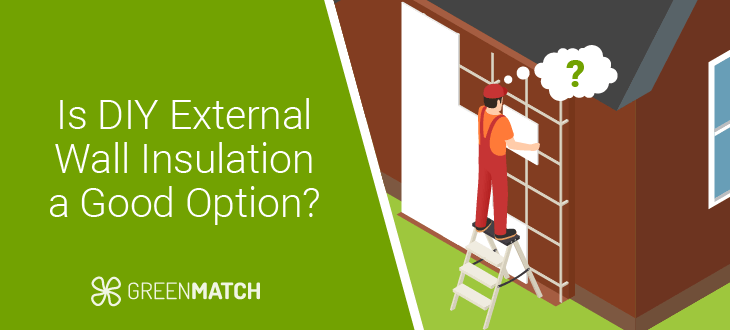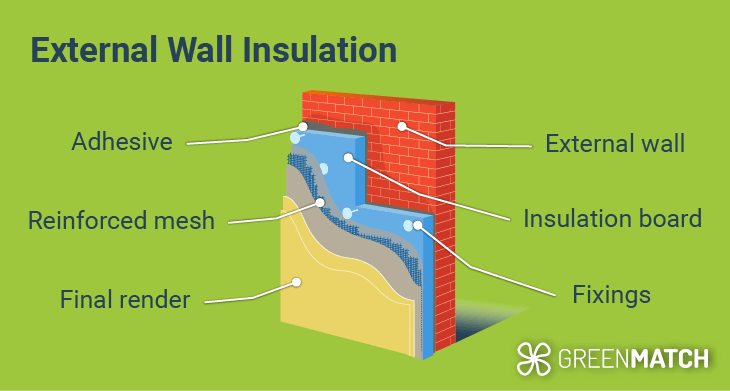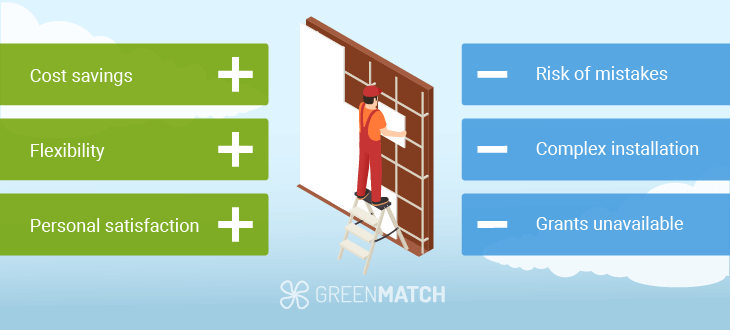Answer these simple questions and we will find you the BEST prices
Which type of solar quotes do you need?
It only takes 30 seconds
100% free with no obligation

Get Free quotes from insulation specialists near you

Save money by comparing quotes and choosing the most competitive offer

The service is 100% free and with no obligation
- GreenMatch
- Insulation
- Insulating Your House
- DIY External Wall Insulation
Is DIY External Wall Insulation a Good Option?


- Labour costs for external wall insulation average around £250 per person per day. By choosing to DIY, you can save on these costs.
- External wall insulation's complexity and time-intensive nature make it a challenging DIY project, with risks like moisture buildup and structural damage.
- Professional installation provides benefits such as precise workmanship, compliance with regulations, and faster completion, often making it a safer and more efficient choice.
- Grants for insulation in the UK are available only if certified professionals carry out the work. DIY projects are not eligible for these financial incentives.
When considering ways to improve your home's energy efficiency and reduce heating costs, external wall insulation is often a top choice. However, the question of whether to tackle this project yourself or hire a professional can be challenging.
DIY external wall insulation offers the potential for significant cost savings, allowing you to take control of the process and customise the project to your liking. Yet, it's a complex and labour-intensive task that requires careful planning, precise execution, and a thorough understanding of materials and building regulations.
In this article, we'll explore the pros and cons of DIY external wall insulation, helping you determine if it's a viable option for your home or if professional installation is the better route.
When insulating your home, getting the job done right is crucial. Whether considering a DIY approach or hiring professionals, consulting with an insulation specialist is essential. But finding the perfect expert can be a hassle.
That's where GreenMatch steps in to make your life easier. We'll connect you with four free, no-obligation quotes from top insulation specialists in your area. Just complete our quick 30-second form, and you'll instantly have your quotes. Click below to kick-start your insulation project and enjoy a stress-free experience!
Fill in the form in just 1 minute
Can you do DIY external wall insulation?
Taking on a DIY external wall insulation project is possible but highly challenging. With an average cost of £11,000 for a three-bedroom semi-detached home, it is one of the most expensive insulation options. Opting for DIY can save you significant labour costs, typically around £250 per person per day, reducing overall expenses. However, this project's complexity and time-intensive nature shouldn't be underestimated.

External wall insulation involves more than just applying an insulating layer to your home's exterior, followed by a protective finish like render or cladding. It requires a solid understanding of building construction, insulation materials, and how to achieve optimal thermal performance.
Additionally, navigating local building regulations and ensuring the work meets required standards can be daunting for those without experience. For example, insulating more than 25% of your walls, you must comply with building regulations, such as ensuring the external wall insulation thickness is between 50mm and 100mm to maintain a U-value below 30 W/m2K. Adhering to fire safety and moisture regulations is also crucial; failure to meet these standards can result in fines or your local authority halting the project.
Mistakes during installation can lead to moisture build-up, thermal bridging, or structural damage, potentially costing more than hiring a professional. The tools and insulation materials required are often specialised, making it easy to compromise the insulation's effectiveness without proper knowledge. Additionally, navigating local building regulations and ensuring the work meets required standards can be daunting for those without experience.
Given the project's complexity, DIY enthusiasts should assess their skills and knowledge before attempting external wall insulation. While feasible, the risks involved mean that professional installation is often safer and more efficient, especially if you aim for long-term performance and compliance with building codes.
Pros and cons of DIY external wall insulation

Undertaking a DIY external wall insulation project may appeal to homeowners seeking to enhance their home's energy efficiency and reduce expenses. While tackling a significant home improvement project independently can be tempting, it's crucial to carefully consider the potential advantages, challenges, and risks involved.
DIY external wall insulation offers the potential for significant insulation cost savings and a gratifying sense of achievement. Still, it also presents complexities that can impact the success and durability of the project. As a result, it is crucial to carefully evaluate the advantages and disadvantages of DIY external wall insulation to make an informed decision.
Pros of DIY installation
- Cost savings: One of the most significant advantages of DIY external wall insulation is the potential to save on labour costs, which can be substantial. By handling the installation yourself, you can avoid the typical £250 per person per day that professionals might charge, reducing the overall project cost significantly.
- Control over the project: Taking on the project yourself gives you complete control over every aspect of the insulation process. You can choose the materials, work at your own pace, and make decisions based on your specific needs and preferences.
- Personal satisfaction: Completing a major home improvement project like external wall insulation can be incredibly rewarding. The sense of accomplishment that comes with successfully insulating your home and potentially lowering your energy bills can be a huge motivator.
- Flexibility: When you manage the project, you have the flexibility to work around your own schedule. You won’t be tied to a contractor's timeline, allowing you to progress as time and resources permit.
Cons of DIY installation
- Complexity and skill requirements: External wall insulation is a complex process that requires a solid understanding of building construction, insulation materials, and thermal performance. Without this knowledge, mistakes can easily occur, leading to ineffective insulation and potentially costly issues like moisture buildup or thermal bridging.
- Time consuming: DIY external insulation can be incredibly time-consuming, especially if you're not experienced in similar projects. What might take a professional team a few days could stretch out over weeks or even months, depending on your availability and expertise.
- Regulatory compliance: When insulating more than 25% of your walls, you must comply with building regulations regarding insulation thickness, U-values, fire safety, and moisture management. Navigating these regulations can be challenging without professional experience, and non-compliance can result in fines or work stoppages.
- Risk of errors and additional costs: Mistakes during installation can lead to serious issues, such as structural damage, moisture problems, or poor insulation performance. These errors can be expensive to fix and might outweigh the initial savings from avoiding professional labour costs.
- Lack of access to professional tools and materials: Professional installers have access to specialised tools and high-quality materials that may not be readily available to DIYers. Without these, it can be difficult to achieve the same level of insulation quality and durability.
- Grants unavailable: In the UK, grants will only be offered to cover the cost of insulation if the installer is PAS 2030 – 2035 certified. Since DIY external wall insulation does not qualify for these grants, opting for a professional installation could save you money.
Why professional help is recommended
When it comes to external wall insulation, seeking professional help is crucial. The installation process involves complexities and potential risks, making the expertise of professionals invaluable in selecting the best materials and techniques for your specific property while adhering to local building regulations.
Hiring professionals ensures top-notch craft, with meticulous attention to detail, that prevents common issues such as moisture buildup, thermal bridging, and structural damage. This level of precision is challenging to achieve in a DIY project. It can lead to costly repairs and reduced insulation effectiveness.
Time is critical. Professional teams can complete the insulation process much faster than an individual homeowner, saving time and minimising disruption to your daily life.
Additionally, professional insulation installers often offer warranties on their work, providing peace of mind that any post-installation issues will be addressed without extra cost.
Considering these benefits, investing in professional external wall insulation services is a smart choice for long-term performance, compliance with building codes, and overall peace of mind.
If you're ready to ensure your home's insulation is done right, GreenMatch can connect you with top insulation specialists in your area. Fill out our quick 30-second form, and we'll provide you with four free quotes from trusted professionals. Click below to start and take the first step towards a warmer, more energy-efficient home.
Fill in the form in just 1 minute
FAQ
Yes, you can do external wall insulation yourself, but it is a complex and time-consuming project that requires a solid understanding of building construction, materials, and thermal performance. Mistakes during installation can lead to issues like moisture build-up and structural damage.
The downsides of DIY external wall insulation include the risk of improper installation, which can lead to moisture build up, thermal bridging, and structural damage. Additionally, the complexity of the project and the need to comply with building regulations make it challenging for non-professionals, potentially resulting in costly mistakes.

Caoimhe is an experienced content writer and researcher who is passionate about providing accessible information to every reader. With a background in English literature and Sociology, she combines the two disciplines to create cohesive, well-thought-out, and well-informed pieces.
We strive to connect our customers with the right product and supplier. Would you like to be part of GreenMatch?

